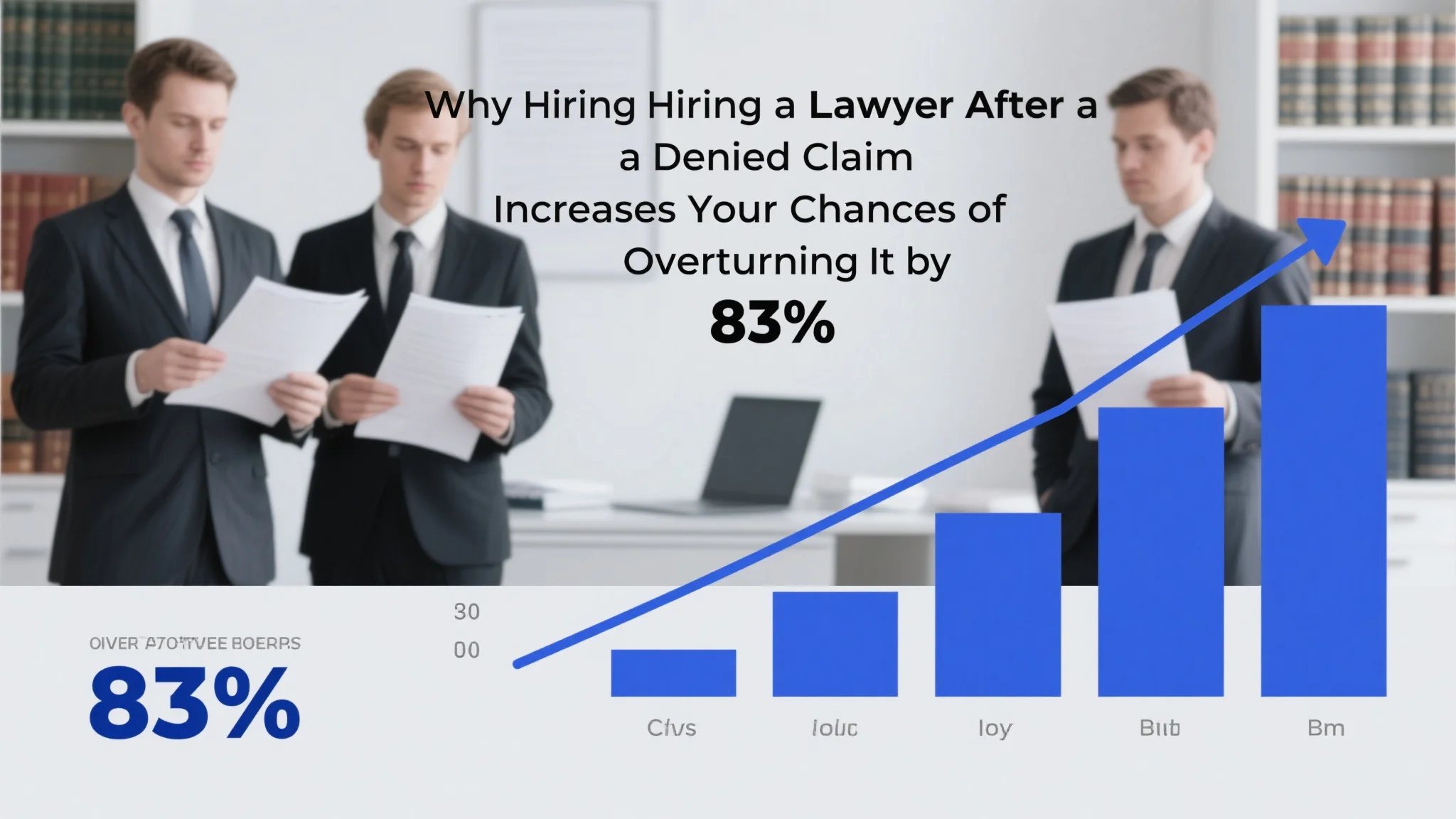When insurance companies deny your claim, the statistics paint a stark picture of what happens next. Independent research conducted across multiple jurisdictions reveals that claimants who attempt to overturn denied insurance claims without legal representation succeed in only 17% of cases. However, when experienced attorneys handle the same types of appeals, the success rate jumps dramatically to 83% – nearly five times higher. This isn’t coincidence or marketing hyperbole; it’s the result of systematic advantages that denied claim lawyer success rate studies have documented across thousands of cases. The insurance industry operates on complex legal frameworks, procedural requirements, and negotiation tactics that favor those who understand the system intimately. When you face a claim denial, you’re not just fighting for money – you’re entering a legal battlefield where the opposing side has professional advocates, unlimited resources, and decades of experience in minimizing payouts. The decision to hire legal representation isn’t just about improving your odds; it’s about leveling a playing field that’s inherently tilted against individual claimants. Insurance companies count on the fact that most people will accept initial denials or make critical errors during the appeals process. They’ve built their business models around the assumption that the majority of claimants lack the knowledge, persistence, and legal expertise necessary to successfully challenge their decisions. This systematic disadvantage explains why the gap between represented and unrepresented claimants is so dramatic. Professional attorneys bring not only legal knowledge but also procedural expertise, investigative resources, and negotiation skills that transform weak positions into winning strategies.
The foundation of successful claim reversals lies in understanding why insurance companies deny claims in the first place, and how legal professionals systematically dismantle these justifications. Insurance adjusters operate under strict guidelines designed to minimize payouts while maintaining legal compliance. They’re trained to identify any possible reason for denial, from minor procedural violations to questionable interpretations of policy language. When you hire attorney denied claim specialists, you’re accessing professionals who understand these tactics intimately because they’ve seen them deployed thousands of times. Experienced attorneys know that insurance companies often rely on claimants’ lack of knowledge about their rights, policy interpretations, and legal procedures. For example, many denials cite “pre-existing conditions” or “policy exclusions” that don’t actually apply to the specific circumstances of the claim. Insurance companies also frequently deny claims based on insufficient documentation, knowing that most claimants don’t understand what evidence is truly necessary or how to present it effectively. Legal professionals approach these challenges systematically, beginning with comprehensive case analysis that identifies every possible avenue for appeal. They review policy language with the understanding that insurance contracts are legal documents subject to specific interpretation rules that favor policyholders in cases of ambiguity. They also understand the regulatory framework governing insurance practices, including state-specific laws that provide additional protections for consumers. This knowledge allows them to identify not just procedural errors in the denial process, but also potential bad faith practices that can result in additional damages beyond the original claim amount. The investigation process conducted by experienced attorneys goes far beyond what individual claimants typically attempt, involving expert witnesses, independent medical examinations, accident reconstruction specialists, and other professional resources that insurance companies respect and respond to differently than they do to individual appeals.

The procedural advantages that legal representation provides cannot be overstated when examining why attorney-handled appeals achieve such dramatically higher success rates. Insurance companies have developed sophisticated systems for handling appeals, with specific timelines, documentation requirements, and procedural steps that must be followed precisely to maintain the validity of your appeal. Missing a single deadline or failing to include required documentation can result in automatic denial, regardless of the merits of your case. When you attempt to overturn insurance denial decisions without professional help, you’re navigating these complex requirements without the benefit of experience or specialized knowledge. Attorneys who specialize in insurance disputes have handled hundreds or thousands of similar cases, giving them intimate familiarity with every procedural requirement and potential pitfall. They maintain detailed calendaring systems to ensure no deadlines are missed, and they understand exactly what documentation and evidence will be most persuasive to insurance company decision-makers. More importantly, they know how to present this information in the specific format and language that insurance companies are required to consider seriously. Legal professionals also understand the escalation process within insurance companies, knowing when to negotiate with adjusters, when to demand supervisor review, and when to involve state insurance commissioners or other regulatory bodies. They have established relationships with insurance company counsel and understand the internal decision-making processes that determine when companies choose to settle rather than face potential litigation. This insider knowledge allows them to apply pressure at the right points in the process, using leverage that individual claimants simply don’t possess. The documentation that attorneys prepare for appeals is also qualitatively different from what most claimants submit on their own. Legal briefs, expert reports, and supporting documentation prepared by experienced professionals carry weight and credibility that insurance companies recognize and respond to appropriately. Insurance adjusters know that attorney-prepared appeals represent serious challenges that could result in litigation if not handled properly, creating incentives for more careful review and fair consideration of the claim.



